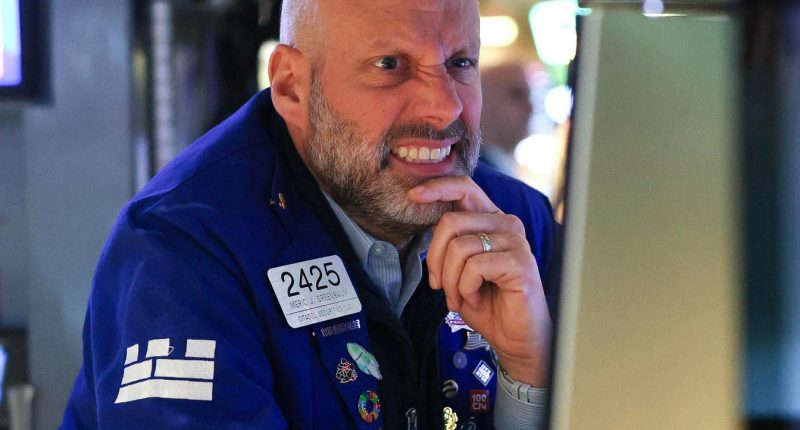Share this @internewscast.com
TOPSHOT – A trader works on the floor of the New York Stock Exchange (NYSE) at the opening bell in … More
AFP via Getty Images
Is anybody watching the news about the financial markets and their own 401(k)s these days? Anybody not? Between tariffs and trade wars and tweets, it’s one of those times when a whole lot of eyes seem to be turned to CNBC and its live market coverage, which led me to get an insider’s view from the center of the financial storm with CNBC’s President KC Sullivan and their long-time senior economics reporter Steve Liesman. Yes, I’m a CNBC alum, but I’m also a consumer here like everybody else.
The history of the news media is filled with heroic efforts of reporters at war fronts – from Edward R. Murrow during World War II’s London Blitz to CBS News’s Dan Rather and Morley Safer in Vietnam to Tyler Hicks covering Afghanistan for 20 years for the New York Times. No reporters face incoming mortar – at least not physically – in reporting business news, but the stakes for those who consume it can be more personal and immediate than most real war reporting. As Liesman told me, “When the [expletive deleted] hits the fan, our reporting has an economic impact.”
CNBC’s unique Key Performance Indicators (KPIs)
Like any division of any publicly traded company, CNBC’s ultimate measuring stick is its bottom line, information not broken out publicly by Comcast (CNBC’s owner until the spin-off of NBCUniversal’s cable assets). Enough to say it has long been a remarkably profitable operation. And CNBC’s numbers under conventional TV metrics are certainly up with the flood of attention to the ups and downs of the new Trump tariff regime: the network’s April 2025 numbers with the “demo” audience (adults 25-54) are better than at any time since the pandemic, ranking among tops in all cable networks during CNBC’s “Business Day,” and its digital numbers are similarly stellar. But even in the absolute best of times for CNBC viewing, it’s audience size pales compared to ratings gold like live sports.
CNBC is really all about who watches, not simply how many. In my CNBC days we did a lot of proprietary research about the “quality” of the CNBC audience, and today CNBC prides itself as being the “top business news TV network for reaching Business Decision Makers, C-Level Executives, Financial Investors, Household Financial Decision Makers, and Ultra Affluents.” Advertisers crave reaching those folks and super-serving that audience in times of fiscal crisis both help define CNBC’s brand at the same time it creates operating challenges.
Preparing for “war”
Covering real wars is expensive. I recall the story from a former President of NBC News who told me how on the eve of the first Gulf War he had to pitch Jack Welch – GE owned NBC at the time – for an emergency funding increase of $30 million to cover the war. Welch signed off.
But luckily for CNBC, its “war” budget is baked in. As CNBC’s Sullivan told me “CNBC lives for moments like this…we were built for it.” CNBC has constructed over many years an ongoing stable of full-time CNBC talent well-versed in the markets as well as a broad and deep array of outside market experts that it calls on every day, not just when the financial alarm bells sound. If you’re a CNBC viewer, you recognize the difference from typical “newscasts.” Anchors aren’t the equivalent of British “news readers” but are expected to add probing questions to interviews with contributors and guests.
Day to day stress of financial market “war correspondents”
Both Sullivan and Liesman described an elevated “buzz” in the CNBC newsroom at times like this. Liesman described it as “an exciting, interesting time, but also a tenuous and nervous time” given what is at stake for U.S. consumers and the world economy. Liesman noted that at these times of financial peril, “a lot of reporters want to tell the great story – [maybe]
the story they have told before. But you have to not make it that story until it is definitively that story.” That requires a huge investment of time in conversations with experts around the world delving into areas that may or may not make it to air but are necessary to understand an environment as complicated as this one.
Liesman described a series of conversations with experts in the arcane world of “financial plumbing” – the technological mechanics that let you electronically direct deposit your check and then go to an ATM to get cash. Liesman hasn’t determined that there is any real crisis with these global financial workings – at least not yet – and noted “if this stuff gets to air, we’re really in trouble.” But you’ve got to do a lot of homework to even make that determination.
CNBC’s reporters like Liesman are constantly on the hunt for whatever added information may illuminate market disruptions, including sources rarely on the day to day radar screen like daily fluctuations of the U.S. dollar. But unlike shooting war correspondents, those who cover the financial markets get to go home at the end of the day and sleep in their own beds. In fact, Liesman described a strange dynamic where “you feel you’re not sure you should be relaxing and taking time off – you could be missing things that might be important and there are a hundred things you could have been doing that you didn’t get to.” And of course, there’s the need to understand and report on any unexpected and game-changing social media post from the White House. That’s something Edward R. Murrow never had to worry about.
Telling the story to quite different audiences
CNBC always appeals to hard-core market watchers, but market turbulence like this draws in waves of more casual or even first-time viewers. As Sullivan pointed out to me: “We have to be inclusive in the journey of how we tell the story. Not taking away from the seriousness of the situation but in a way that serves all of the audience.” Liesman thoughtfully laid out the challenge of serving audiences with varied levels of expertise of their own: “You have to play your natural game – none of us are actors and you can’t change on the fly to reach different audiences. On the other hand, I think the most important part of my job is to explain complicated stuff to people and that demands time and attention on its own.”
As Sullivan points out, the development of digital products such as the new CNBC+ – what else would it be called? – has changed the coverage game as well. CNBC has “a lot more tools in the tool shed” to serve multiple audience types, being able to dive deeply into specialized market sectors and geographies that might not warrant time on-air. And that of course is the future for all of news media – delivering content across many platforms as audiences get more sophisticated about where, when, and how they want to consume the stories that will shape their lives.








